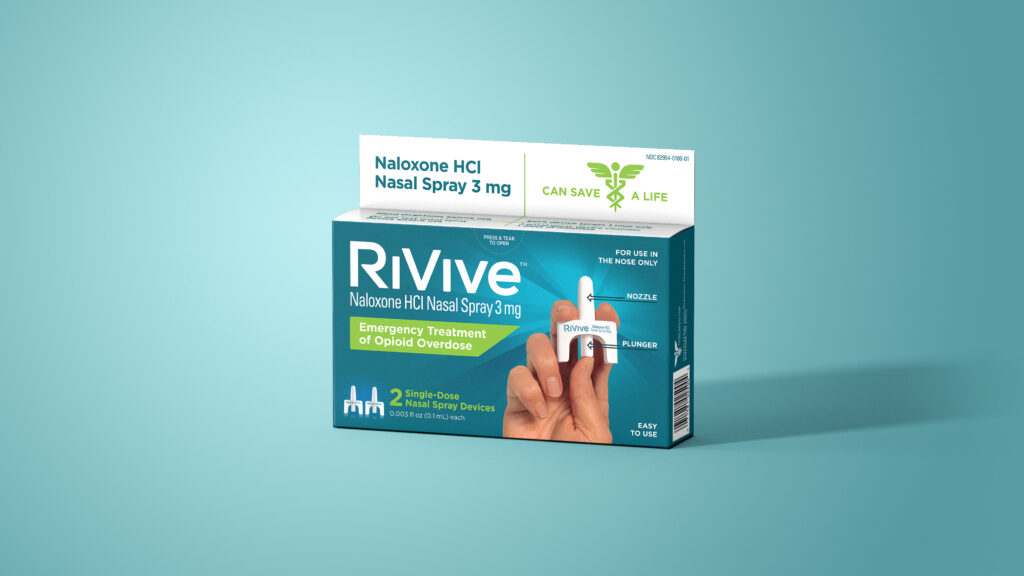A nonprofit naloxone manufacturer is celebrating its recent market approval by giving away 200,000 doses of its over-the-counter nasal spray.
Harm Reduction Therapeutics said in a statement that it will donate nearly a quarter-million doses of its new product to the Remedy Alliance, an organization devoted to affordable naloxone access. The announcement comes on the heels of the Food and Drug Administration’s approval of Harm Reduction Therapeutics’ product RiVive, a new nasal naloxone spray used to reverse opioid overdose.
The 200,000-dose donation represents roughly 10% of Harm Reduction Therapeutics’ expected annual production, the nonprofit said.
“We founded Harm Reduction Therapeutics with the singular mission to prevent opioid overdose deaths,” Michael Hufford, the organization’s CEO, said in a statement. “We’re dedicated to making free or low-cost over-the-counter naloxone nasal spray available to the communities who need it most.”
RiVive is the second naloxone product to receive clearance to be sold over the counter. The first, Narcan, received FDA approval in March.
Naloxone is viewed as a critical component of the U.S. response to the opioid epidemic. But its high price has hindered public health agencies and community groups’ efforts to buy and distribute the medication en masse.
The Biden administration has recently made naloxone pricing a focus, convening a meeting of for-profit manufacturers to discuss ensuring the medication is financially accessible. That meeting, however, notably excluded both Remedy Alliance and Harm Reduction Therapeutics.
The meeting came amid continued criticism that focused in particular on Narcan’s manufacturer. The company, Emergent BioSolutions, has long faced criticism for the price of its nasal spray, which currently retails for anywhere between $38 and $124 per two-pack, according to the drug pricing website GoodRx.com. Hufford has said that Narcan’s high price partly inspired his founding the nonprofit, and its development of a largely identical product.
Other manufacturers have also rushed to bring naloxone products to the market, including mechanically complex, high-dose versions that can cost hundreds or even thousands of dollars. A dose of generic, injectable naloxone, by contrast, can cost just a few dollars.
RiVive will be sold for as much as 40% less than Narcan, according to a spokesman, meaning that a typical two-pack of the nonprofit’s nasal spray could go for as little as $30 compared to a typical Narcan price of $50.
The new nasal spray also comes in a 3 mg dose — slightly less than Narcan’s 4 mg, and significantly smaller than high-dose products like expensive, brand-name products like Kloxxado or Zimhi, which contain 8 mg and 5 mg of naloxone, respectively.
RiVive’s smaller dose allows more flexibility for people attempting to reverse an overdose, the company said. While it can be administered as many times as necessary, studies show large naloxone doses are not necessarily more effective at reversing overdoses. Smaller doses, meanwhile, can help avoid the severe withdrawal symptoms that many people experience upon being revived from an overdose.
Rahul Gupta, the director of the White House Office of National Drug Control Policy, applauded RiVive’s approval last month, and encouraged more companies to work to make naloxone affordable.
“I applaud all companies working to heed the President’s call to increase access and affordability of these life-saving medications, and we urge more companies to follow their lead,” he said in a statement. “As we are seeing overdose death rates level off after years of rapid increases, we must do everything we can to double down on our efforts to end this epidemic. Today’s approval means that more life-saving overdose reversal products will be available over-the-counter for consumers, and more competition in the market should drive down costs.”
STAT’s coverage of chronic health issues is supported by a grant from Bloomberg Philanthropies. Our financial supporters are not involved in any decisions about our journalism.


